
David Reed the Conservative MP for Exmouth & Exeter East made tackling sewage spills a key priority in his election campaign last year & now believes his part in scrutinising forthcoming laws centred on water companies means he is making good on my promise
A Devon MP has cheered cross-party efforts to help craft new laws aimed at bringing water companies “back to heel”.
David Reed, the Conservative MP for Exmouth and Exeter East made tackling sewage spills a key priority in his election campaign last year, and now believes his part in scrutinising forthcoming laws centred on water companies means he is “making good on my promise”.
Mr Reed said his inclusion on the committee taking the Water Bill through parliament means he had been able to “scrutinise the proposed law and strengthen it” wherever possible.
The Water (Special Measures) Bill is aimed at tackling poor performance by water companies, including on issues such as financial management, water pollution and outcomes for customers.
South West Water experienced several challenges last year, most notably because of an outbreak of cryptosporidium in Brixham and sewage spills in Exmouth that led to beach closures at the height of the tourist season.
The bill, which is currently at the report stage in the House of Commons, will have various aims, including to block bonuses for water company executives whose firms pollute waterways, enable criminal charges to be brought against persistent law-breakers, and to impose automatic fines for wrongdoing.
Mr Reed raised questions in parliament earlier this month about whether any water boss would realistically go to prison because of the bill, prompting the under-secretary of state for the Department for Environment, Food and Rural Affairs (Defra), Emma Hardy, to state she did “not expect this measure to materially impact on court case numbers”.
The bill will also aim to enable independent monitoring of every sewer overflow outlet, something that is likely to be seen as important by campaigners who claim that some water company data on spills differs from independent sources.
“All these points are vital to bringing water companies back to heel, and most importantly, starting on the journey to improving our waterways and coastal areas,” Mr Reed said.
“The cross-party committee worked collaboratively throughout, and I’m proud that we were able to work together to give the bill the teeth it needs to have effect.
“More importantly I must pay tribute to the many individuals and groups who submitted evidence to myself and the committee.”
Mr Reed highlighted the efforts of End Sewage Convoys and Pollution Exmouth (Escape) for its “comprehensive report” on the bill’s merits and flaws.
In spite of the progress, Mr Reed said this is “just the start” of his campaign.
“There will be much more to do in the coming years,” he said.
“I still take the view that we need to attack this issue in three directions. That is ensuring that SWW properly invest in infrastructure and maintenance, analysing house building and pushing back if SWW’s planned infrastructure cannot meet demand, and updating or introducing laws to stamp out harmful behaviours.”
Last month, SWW said it had replaced a section of sewer in Exmouth that should “protect customers and the environment from potential pollutions”.
“Teams have worked hard over the past eight weeks to replace over 300 metres of sewer entering Maer Lane wastewater treatment works to improve services for customers, businesses and visitors to the area following issues with the network over the past 12 months,” the firm said in a statement on its website in December.
“We aimed to finish the work before the end of the year and despite very challenging weather conditions, including two named storms and freezing temperatures, the work is now complete, in time for Christmas and over a week ahead of schedule.”
The firm added that the work formed part of a wider £38 million investment to improve its services in Exmouth and follows £20 million that it said had already been invested in the area over the past five years.

 East Devon MP urges action on safer walking and cycling routes to schools
East Devon MP urges action on safer walking and cycling routes to schools
 Residents knitting club create comfort bears for police to help distressed children
Residents knitting club create comfort bears for police to help distressed children
 Using AI and machine learning to improve stroke outcomes
Using AI and machine learning to improve stroke outcomes
 Man arrested after schools in Exeter were threatened on social media
Man arrested after schools in Exeter were threatened on social media
 Police appeal for sightings of wanted man
Police appeal for sightings of wanted man
 Students look to turn Tik Tok videos into viral hits
Students look to turn Tik Tok videos into viral hits
 Exeter children’s library is getting a big makeover
Exeter children’s library is getting a big makeover
 Postal vote requests jump nearly 20% in key election division
Postal vote requests jump nearly 20% in key election division











